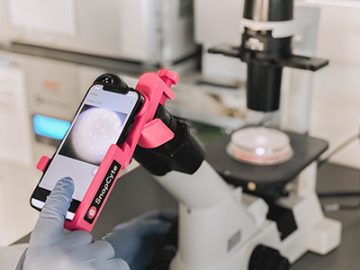
Dr. Mads Daugaard
Transformative technology developed by Vancouver Coastal Health Research Institute (VCHRI) researcher Dr. Mads Daugaard at the Vancouver Prostate Centre (VPC) is putting cell analytics into the hands of scientists around the globe. Dr. Daugard is an associate professor with the Department of Urologic Sciences at the University of British Columbia and a senior research scientist and head of the Molecular Pathology and Cell Imaging Unit with the VPC.
The artificial intelligence (AI)-driven smartphone app SnapCyte produces data used in cell growth medical research at a fraction of the cost and in a more timely manner than current technology.
“We developed SnapCyte based on a need for affordable, basic cell analytics that can be accessed by any scientist working in a cell culture or biotechnology laboratory,” says Daugaard.

Cell cultures can be photographed through any lab microscope with the use of the SnapCyte adaptor. The app that can be then used to process the images for analysis works on iPhone and Androids alike.
Used in the analysis of cancer cells and other diseases at a microscopic scale, the first-of-its-kind SnapCyte app could supercharge the development of novel, personalized medical treatments, says Daugaard.
The app returns precision data results within five minutes,” says Daugaard. “With the former technology, this process would normally take 45 minutes to an hour with the most high-end live-cell imaging and analysis platforms, or 24 hours with colorimetric assays.”
At a few hundred dollars per year, the app’s affordability makes the platform an accessible option for laboratories that are unable to buy costly cell analytics equipment.
“Many laboratories do not have the funding to purchase new $25,000 to $30,000 machines, or the budget to support the ongoing investment of thousands of dollars per month required to use the equipment,” says Daugaard.
The SnapCyte App is currently undergoing final beta testing and is expected to launch worldwide beginning of 2023.
Click here for more information on the VCHRI website’s original post.